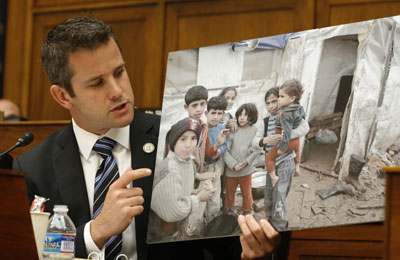
US Representative Adam Kinzinger holds a picture
of Syrian children as he addresses a Foreign Affairs
Committee hearing.
US resolution on Syria strike passes first hurdle
Washington, September 5, 2013
US President Barack Obama's effort to win legislative backing for military strikes against Syria passed its first hurdle on Wednesday when a Senate committee voted in favour, but the narrow margin of victory showed the depth of US caution.
In a possible sign of internal unrest in Syrian President Bashar al-Assad's ruling Alawite sect in the shadow of a likely US intervention, Syrian opposition figures said General Ali Habib, a former defense minister, had defected. Syria denied the report.
Washington and Syria's main backer, Russia, remained publicly at odds as Obama tried to build his case for military action over chemical weapons before flying to Russia for a G20 summit hosted by President Vladimir Putin on Thursday.
Putin said US congressional approval without a UN Security Council resolution would be an act of aggression, and accused US Secretary of State John Kerry of lying by playing down the role of the militant group al Qaeda with rebel forces.
With Obama focused on building international support, administration officials kept up their campaign of persuasion in Congress, where deep US scepticism about going to war was reflected in a House of Representatives hearing.
Still, after much jockeying over the exact wording, the Senate Foreign Relations Committee approved a resolution authorising the use of military force in Syria in a vote that avoided party lines, with Democrats and Republicans on both sides. The action cleared the way for a vote in the full Senate, likely next week.
The committee voted 10-7 in favour of a compromise resolution that sets a 60-day limit on any engagement in Syria, with a possible 30-day extension, and bars the use of US troops on the ground for combat operations.
The administration is trying to balance the views of many in Congress who want a narrowly defined resolution against hawks such as Senator John McCain, who has pushed for a broader resolution that would allow direct US support for rebels.
The Senate committee adopted amendments proposed by McCain with policy goals of degrading Assad's ability to use chemical weapons, increasing support for rebel forces and reversing battlefield momentum to create conditions for Assad's removal.
The authorization still faces significant resistance in Congress, where many lawmakers fear it could lead to a prolonged US military involvement in Syria's civil war and spark an escalation of regional violence.
The full Senate is expected to vote on the resolution next week. The House of Representatives also must approve the measure.
RUSSIAN TENSIONS
Obama said he would continue to try to persuade Putin of the need for punitive strikes on Assad for using chemical weapons when the two meet in St. Petersburg.
In Stockholm en route to Russia, Obama said the credibility of America and of the world was at stake. He appeared to take umbrage at a reporter's question about the "red line" he set for Assad at an August 2012 White House news conference.
"I did not set a red line. The world set a red line," Obama said, referring to bans on chemical weapons use.
Putin again questioned Western evidence. He accused Kerry outright of lying when, in urging Congress to approve strikes on Syria, Kerry played down the role of al Qaeda in the rebel forces. "Al Qaeda units are the main military echelon, and they know this," Putin said.
"He is lying and knows he is lying. It's sad."
Earlier, Putin had said in a pre-summit interview with the Associated Press that he could not absolutely "rule out" Russia supporting a UN Security Council resolution to punish Assad - if it could be proved he had used poison gas.
Briefing members of Congress in Washington, Kerry said those comments were "hopeful" and "there may be a road forward where Russia would consider not blocking action."
Kerry played down concerns that any US military strike over chemical weapons might provoke a clash with Russia.
"Foreign Minister (Sergei) Lavrov has made it clear ... Russia does not intend to fight a war over Syria," Kerry told a hearing of the House Foreign Affairs Committee.
A senior Western official said that while Moscow was unlikely to say so in public, there were signs Russian officials believe Assad was responsible for the deaths on Aug. 21 and that it had strained Russian support for him - providing an opening for a new, concerted drive to end the conflict. - Reuters







